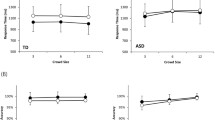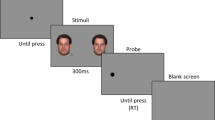Abstract
A core feature of Autistic Spectrum Condition (ASC) is the presence of difficulties in social interactions. This can be explained by an atypical attentional processing of social information: individuals with ASC may show problems with orienting attention to socially relevant stimuli and/or inhibiting their attentional responses to irrelevant ones. To shed light on this issue, we examined attentional orienting and inhibitory control to emotional stimuli (angry, happy, and neutral faces). An antisaccade task (with both prosaccade and antisacade blocks) was applied to a final sample of 29 children with ASC and 27 children with typical development (TD). Whereas children with ASC committed more antisaccade errors when seeing angry faces than happy or neutral ones, TD children committed more antisaccade errors when encountering happy faces than neutral faces. Furthermore, latencies in the prosaccade and antisaccade blocks were longer in children with ASC and they were associated with the severity of ASC symptoms. Thus, children with ASC showed an impaired inhibitory control when angry faces were presented. This bias to negative high-arousal information is congruent with affective information-processing theories on ASC, suggesting that threatening stimuli induce an overwhelming response in ASC. Therapeutic strategies where train the shift attention to emotional stimuli (i.e. faces) may improve ASC symptomatology and their socials functioning.



Similar content being viewed by others
References
Achenbach, T. M., & Edelbroch, C. S. (1991). Manual for the child behavior checklist and revised child profile. Burlington: University of Vermouth.
Agam, Y., Joseph, R. M., Barton, J. J. S., & Manoach, D. S. (2010). Reduced cognitive control of response inhibition by the anterior cingulate cortex in autism spectrum disorders. Neuroimage, 52(1), 336–347. https://doi.org/10.1016/j.neuroimage.2010.04.010.
American Psychological Association (APA). (2013). Diagnostic and statistical manual manual of mental disorders (5th ed.). Washington, D.C.: American Psychiatric Association.
Bastiaansen, J. A., Thioux, M., Nanetti, L., Van Der Gaag, C., Ketelaars, C., Minderaa, R., & Keysers, C. (2011). Age-related increase in inferior frontal gyrus activity and social functioning in autism spectrum disorder. Biological Psychiatry, 69(9), 832–838. https://doi.org/10.1016/j.biopsych.2010.11.007.
Beall, P. M., Moody, E. J., McIntosh, D. N., Hepburn, S. L., & Reed, C. L. (2008). Rapid facial reactions to emotional facial expressions in typically developing children and children with autism spectrum disorder. Journal of Experimental Child Psychology, 101(3), 206–223. https://doi.org/10.1016/j.jecp.2008.04.004.
Beck, A. T. (1976). Cognitive therapy and the emotional disorders. New York: New American Library.
Chawarska, K., MacAri, S., & Shic, F. (2012). Context modulates attention to social scenes in toddlers with autism. Journal of Child Psychology and Psychiatry and Allied Disciplines, 53(8), 903–913. https://doi.org/10.1111/j.1469-7610.2012.02538.x.
Dawson, G., Webb, S. J., & Mcpartland, J. (2005). Understanding the nature of Face Processing Impairment in Autism: Insights from behavioral and electrophysiological studies. Developmental Neuropsychology, 27(3), 403–424. https://doi.org/10.1207/s15326942dn2703_6.
Derakshan, N., Salt, M., & Koster, E. H. W. (2009). Attentional control in dysphoria: An investigation using the antisaccade task. Biological Psychology, 80(2), 251–255. https://doi.org/10.1016/j.biopsycho.2008.09.005.
Ebner, N. C., Riediger, M., & Lindenberger, U. (2010). FACES-a database of facial expressions in young, middle-aged, and older women and men: Development and validation. Behavior Research Methods, 42(1), 351–362. https://doi.org/10.3758/BRM.42.1.351.
Falck-Ytter, T., Bölte, S., & Gredebäck, G. (2013). Eye tracking in early autism research. Journal of Neurodevelopmental Disorders, 5(1), 28. https://doi.org/10.1186/1866-1955-5-28.
García-Blanco, A. C., Perea, M., & Salmerón, L. (2013). Attention orienting and inhibitory control across the different mood states in bipolar disorder: An emotional antisaccade task. Biological Psychology, 94, 556–561. https://doi.org/10.1016/j.biopsycho.2013.10.005.
García-Blanco, A. C., Yáñez, N., Vázquez, M. A., Marcos, I., & Perea, M. (2017). Modulation of attention by socio-emotional scenes in children with autism spectrum disorder. Research in Autism Spectrum Disorders, 33, 39–46. https://doi.org/10.1016/j.rasd.2016.11.002.
García-Blanco, A., López-Soler, C., Vento, M., García-Blanco, M. C., Gago, B., & Perea, M. (2017b). Communication deficits and avoidance of angry faces in children with autism spectrum disorder. Research in Developmental Disabilities, 62, 218–226. https://doi.org/10.1016/j.ridd.2017.02.002.
Ghosn, F., Perea, M., Castelló, J., Vázquez, M., Yáñez, N., Marcos, I., Sahuquillo, R., Vento, M., & García-Blanco, A. (2019). Attentional patterns to emotional faces Versus scenes in children with Autism Spectrum disorders. Journal of Autism and Developmental Disorders, 49(4), 1484–1492. https://doi.org/10.1007/s10803-018-3847-8.
Goldberg, M. C., Lasker, A. G., Zee, D. S., Garth, E., Tien, A., & Landa, R. J. (2002). Deficits in the initiation of eye movements in the absence of a visual target in adolescents with high functioning autism. Neuropsychologia, 40(12), 2039–2049. https://doi.org/10.1016/S0028-3932(02)00059-3.
Guillon, Q., Hadjikhani, N., Baduel, S., & Rogé, B. (2014). Visual social attention in autism spectrum disorder: Insights from eye tracking studies. Neuroscience and biobehavioral reviews (Vol. 42, pp. 279–297). Amsterdam: Elsevier. https://doi.org/10.1016/j.neubiorev.2014.03.013
Hare, T. A., Tottenham, N., Davidson, M. C., Glover, G. H., & Casey, B. J. (2005). Contributions of amygdala and striatal activity in emotion regulation. Biological Psychiatry, 57(6), 624–632. https://doi.org/10.1016/j.biopsych.2004.12.038.
Hill, E. L. (2004). Executive dysfunction in autism. Trends in cognitive sciences (Vol. 8, pp. 26–32). Amsterdam: Elsevier. https://doi.org/10.1016/j.tics.2003.11.003
Hollocks, M. J., Ozsivadjian, A., Matthews, C. E., Howlin, P., & Simonoff, E. (2013). The relationship between attentional bias and anxiety in children and adolescents with autism spectrum disorders. Autism Research, 6(4), 237–247. https://doi.org/10.1002/aur.1285.
Hutton, S. B., & Ettinger, U. (2006). The antisaccade task as a research tool in psychopathology: A critical review. Psychophysiology, 43(3), 302–313. https://doi.org/10.1111/j.1469-8986.2006.00403.x.
Isomura, T., Ogawa, S., Yamada, S., Shibasaki, M., & Masataka, N. (2014). Preliminary evidence that different mechanisms underlie the anger superiority effect in children with and without autism spectrum disorders. Frontiers in Psychology, 5, 461. https://doi.org/10.3389/fpsyg.2014.00461
Kaufman, A. S. (1997). K-BIT. Test Breve De Inteligencia De Kaufman [Kaufman brief IntelligenceTest (K-BIT)]. TEA.
Keehn, B., Müller, R. A., & Townsend, J. (2013). Atypical attentional networks and the emergence of autism. In Neuroscience and Biobehavioral Reviews, 37(2), 164–183. https://doi.org/10.1016/j.neubiorev.2012.11.014
Kleinhans, N. M., Richards, T., Weaver, K., Johnson, L. C., Greenson, J., Dawson, G., & Aylward, E. (2010). Association between amygdala response to emotional faces and social anxiety in autism spectrum disorders. Neuropsychologia, 48(12), 3665–3670. https://doi.org/10.1016/j.neuropsychologia.2010.07.022.
Liang, J., & Wilkinson, K. (2018). Gaze toward naturalistic social scenes by individuals with intellectual and developmental disabilities: Implications for augmentative and alternative communication designs. Journal of Speech Language and Hearing Research, 61(5), 1157–1170. https://doi.org/10.1044/2018_JSLHR-L-17-0331.
Lopez, B. R., Lincoln, A. J., Ozonoff, S., & Lai, Z. (2005). Examining the relationship between executive functions and restricted, repetitive symptoms of autistic disorder. Journal of Autism and Developmental Disorders, 35(4), 445–460. https://doi.org/10.1007/s10803-005-5035-x.
Luna, B., Doll, S. K., Hegedus, S. J., Minshew, N. J., & Sweeney, J. A. (2007). Maturation of executive function in Autism. Biological Psychiatry, 61(4), 474–481. https://doi.org/10.1016/j.biopsych.2006.02.030.
Manoach, D. S., Lindgren, K. A., & Manoach, D. S. (2004). Deficient saccadic inhibition in Asperger’s disorder and the social-emotional processing disorder. Journal of Neurology, Neurosurgery and Psychiatry, 75, 1719–1726. https://doi.org/10.1136/jnnp.2003.025981.
Markram, H. (2007). The intense world syndrome—an alternative hypothesis for autism. Frontiers in Neuroscience, 1(1), 77–96. https://doi.org/10.3389/neuro.01.1.1.006.2007
Markram, K., & Markram, H. (2010). The intense world theory—A unifying theory of the neurobiology of autism. Frontiers in Human Neuroscience. https://doi.org/10.3389/fnhum.2010.00224
Matsuda, S., Minagawa, Y., & Yamamoto, J. (2015). Gaze behavior of children with ASD toward pictures of facial expressions. Autism Research and Treatment, 2015, 617190. https://doi.org/10.1155/2015/617190
Minshew, N. J., Luna, B., & Sweeney, J. A. (1999). Oculomotor evidence for neocortical systems but not cerebellar dysfunction in autism. Neurology, 52(5), 917–922. https://doi.org/10.1212/wnl.52.5.917.
Mosconi, M. W., Kay, M., Seidenfeld, A., Guter, S., Stanford, L. D., & Sweeney, J. A. (2009). Impaired inhibitory control is associated with higher-order repetitive behaviors in autism spectrum disorders. Cambridge Org. https://doi.org/10.1017/S0033291708004984.
Mueller, S. C., Ng, P., Temple, V., Hardin, M. G., Pine, D. S., Leibenluft, E., & Ernst, M. (2010). Perturbed reward processing in pediatric bipolar disorder: An antisaccade study. Journal of Psychopharmacology, 24(12), 1779–1784. https://doi.org/10.1177/0269881109353462.
Norbury, C. F., Brock, J., Cragg, L., Einav, S., Griffiths, H., & Nation, K. (2009). Eye-movement patterns are associated with communicative competence in autistic spectrum disorders. Journal of Child Psychology and Psychiatry and Allied Disciplines, 50(7), 834–842. https://doi.org/10.1111/j.1469-7610.2009.02073.x.
Posner, M. I., & Dehaene, S. (1994). Attentional networks. In Trends in Neurosciences (Vol. 17, Issue 2, pp. 75–79). Elsevier Current Trends. https://doi.org/10.1016/0166-2236(94)90078-7.
Rogers, S. J. (2000). Diagnosis of autism before the age of 3. International Review of Research in Mental Retardation, 23, 1–31. https://doi.org/10.1016/s0074-7750(00)80004-x.
Sacrey, L. A. R., Armstrong, V. L., Bryson, S. E., & Zwaigenbaum, L. (2014). Impairments to visual disengagement in autism spectrum disorder: A review of experimental studies from infancy to adulthood. Neuroscience and biobehavioral reviews (Vol. 47, pp. 559–577). Amsterdam: Elsevier. https://doi.org/10.1016/j.neubiorev.2014.10.011
Schulz, K. P., Fan, J., Magidina, O., Marks, D. J., Hahn, B., & Halperin, J. M. (2007). Does the emotional go/no-go task really measure behavioral inhibition? Convergence with measures on a non-emotional analog. Archives of Clinical Neuropsychology, 22, 151–160. https://doi.org/10.1016/j.acn.2006.12.001.
Smith, A. (2009). The empathy imbalance hypothesis of autism: A theoretical approach to cognitive and emotional empathy in autistic development. Psychological Record, 59(3), 489–510. https://doi.org/10.1007/BF03395675.
South, M., Ozonoff, S., & Mcmahon, W. M. (2007). The relationship between executive functioning, central coherence, and repetitive behaviors in the high-functioning autism spectrum. Autism, 11(5), 437–451. https://doi.org/10.1177/1362361307079606.
Théoret, H., Haque, J., & Pascual-Leone, A. (2001). Increased variability of paced finger tapping accuracy following repetitive magnetic stimulation of the cerebellum in humans. Neuroscience Letters, 306(1–2), 29–32. https://doi.org/10.1016/S0304-3940(01)01860-2.
Uono, S., Sato, W., & Toichi, M. (2009). Dynamic fearful gaze does not enhance attention orienting in individuals with Asperger’s disorder. Brain and Cognition, 71(3), 229–233. https://doi.org/10.1016/j.bandc.2009.08.015
Wagner, J. B., Hirsch, S. B., Vogel-Farley, V. K., Redcay, E., & Nelson, C. A. (2013). Eye-tracking, autonomic, and electrophysiological correlates of emotional face processing in adolescents with autism spectrum disorder. Journal of Autism and Developmental Disorders, 43(1), 188–199. https://doi.org/10.1007/s10803-012-1565-1.
Waters, A. M., Mogg, K., Bradley, B. P., & Pine, D. S. (2008). Attentional bias for emotional faces in children with generalized anxiety disorder. Journal of the American Academy of Child and Adolescent Psychiatry, 47(4), 435–442. https://doi.org/10.1097/CHI.0b013e3181642992.
Wieckowski, A. T., & White, S. W. (2017). Eye-Gaze Analysis of Facial Emotion Recognition and expression in adolescents with ASD. Journal of Clinical Child and Adolescent Psychology, 46(1), 110–124. https://doi.org/10.1080/15374416.2016.1204924.
Yiend, J. (2010). The effects of emotion on attention: A review of attentional processing of emotional information. Cognition and Emotion, 24(1), 3–47. https://doi.org/10.1080/02699930903205698.
Zhao, X., Zhang, P., Fu, L., & Maes, J. H. R. (2016). Attentional biases to faces expressing disgust in children with autism spectrum disorders: An exploratory study. Scientific Reports, 6(1), 19381. https://doi.org/10.1038/srep19381
Funding
This study has been funded by the Carlos III Health Institute (Ministry of Science and Innovation) through the Miguel Servet CP21/0008 and Juan Rodés JR22/00030 contracts, and cofinanced by the European Union. Likewise, it is part of the PI18/01352 and PI21/00549 projects, funded by the Carlos III Health Institute (ISCIII) (Ministry of Science and Innovation) and cofinanced by the European Union.
Author information
Authors and Affiliations
Contributions
A.G-B., and M.P. designed the larger study from which this data was taken. A.G-B. and R.S-L. developed the concept for the current paper. R.S-L., A.M-G., and J.A. collected the data. L.S. analyzed the data. R.S-L., M.P., D.P., M.V., and A.G-B. wrote sections of the paper. All authors discussed the results and implications and edited the manuscript at all stages.
Corresponding author
Ethics declarations
Conflict of interest
The authors declare that they have no conflict of interest.
Ethical approval
All procedures performed in this study were in accordance with the ethical standards of the institutional and/or national research committee and with the 1964 Helsinki declaration and its later amendments or comparable ethical standards.
Additional information
Publisher’s Note
Springer Nature remains neutral with regard to jurisdictional claims in published maps and institutional affiliations.
Rights and permissions
Springer Nature or its licensor (e.g. a society or other partner) holds exclusive rights to this article under a publishing agreement with the author(s) or other rightsholder(s); author self-archiving of the accepted manuscript version of this article is solely governed by the terms of such publishing agreement and applicable law.
About this article
Cite this article
Sahuquillo-Leal, R., Perea, M., Moreno-Giménez, A. et al. Emotional Face Processing in Autism Spectrum Condition: A Study of Attentional Orienting and Inhibitory Control. J Autism Dev Disord (2024). https://doi.org/10.1007/s10803-023-06200-6
Accepted:
Published:
DOI: https://doi.org/10.1007/s10803-023-06200-6




